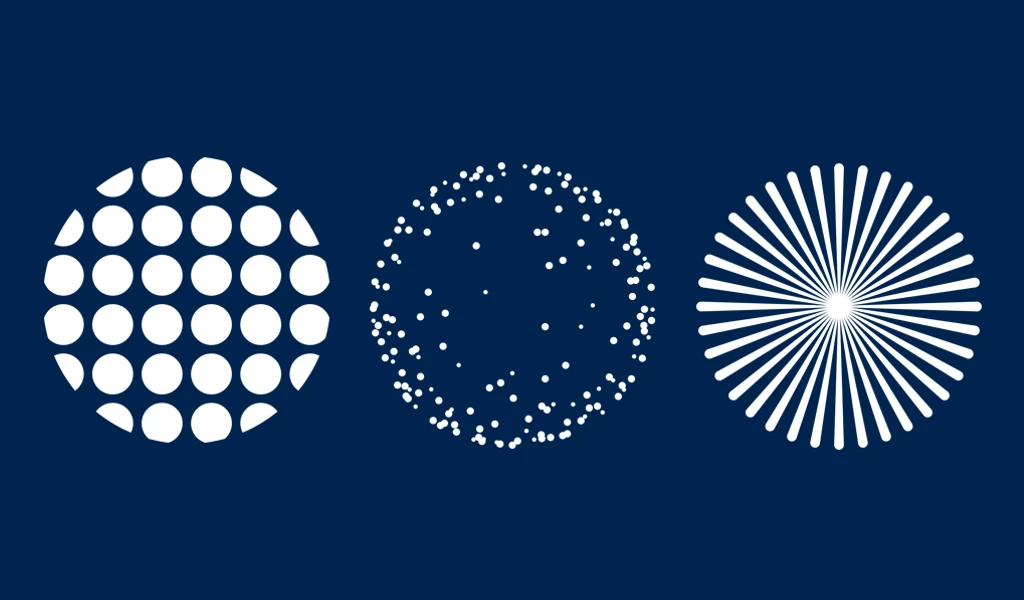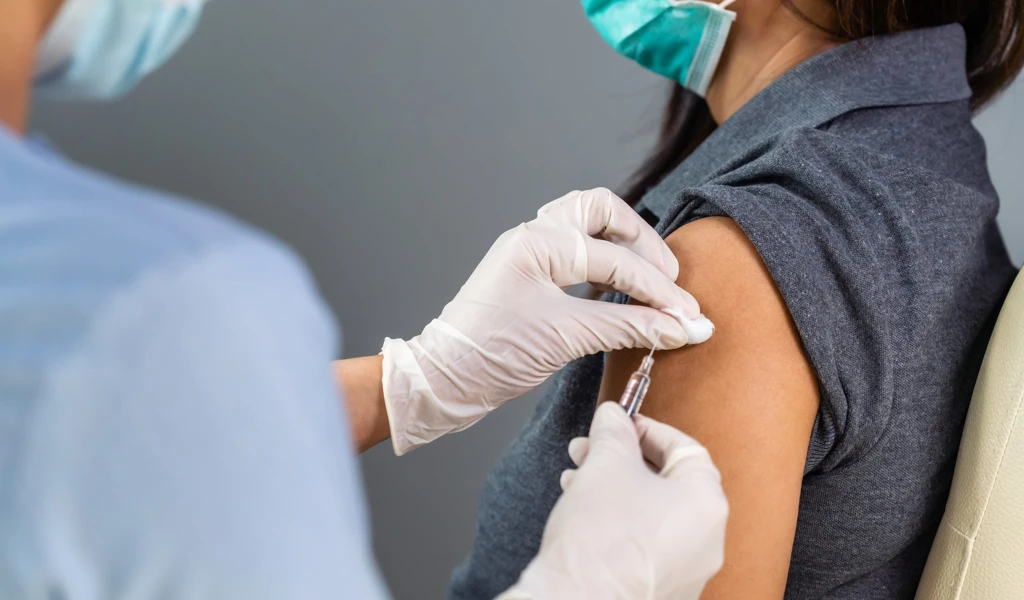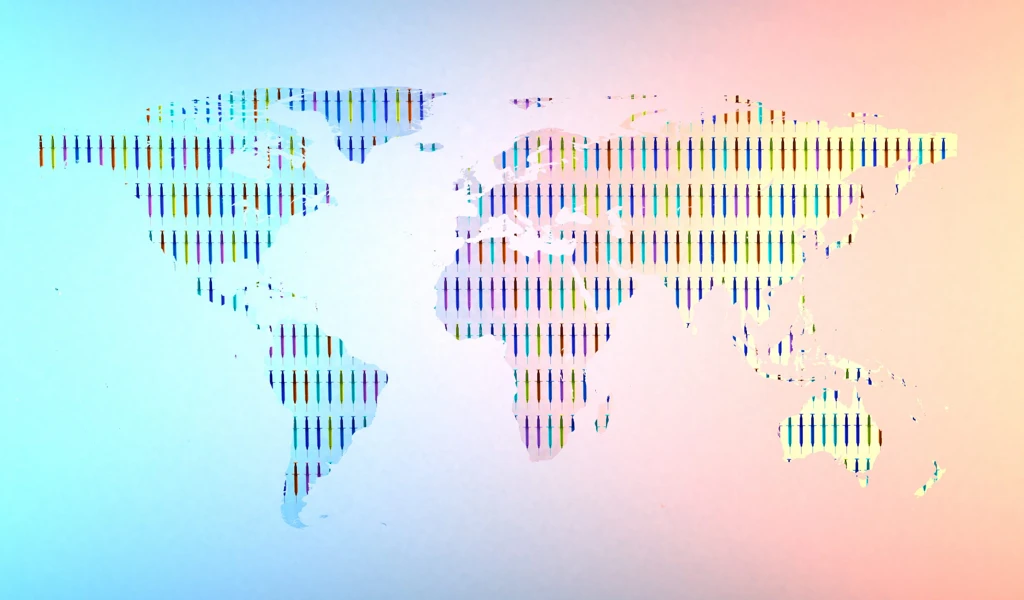COVID-19 vaccine doses shipped by the COVAX Facility head to Ghana, marking beginning of global rollout
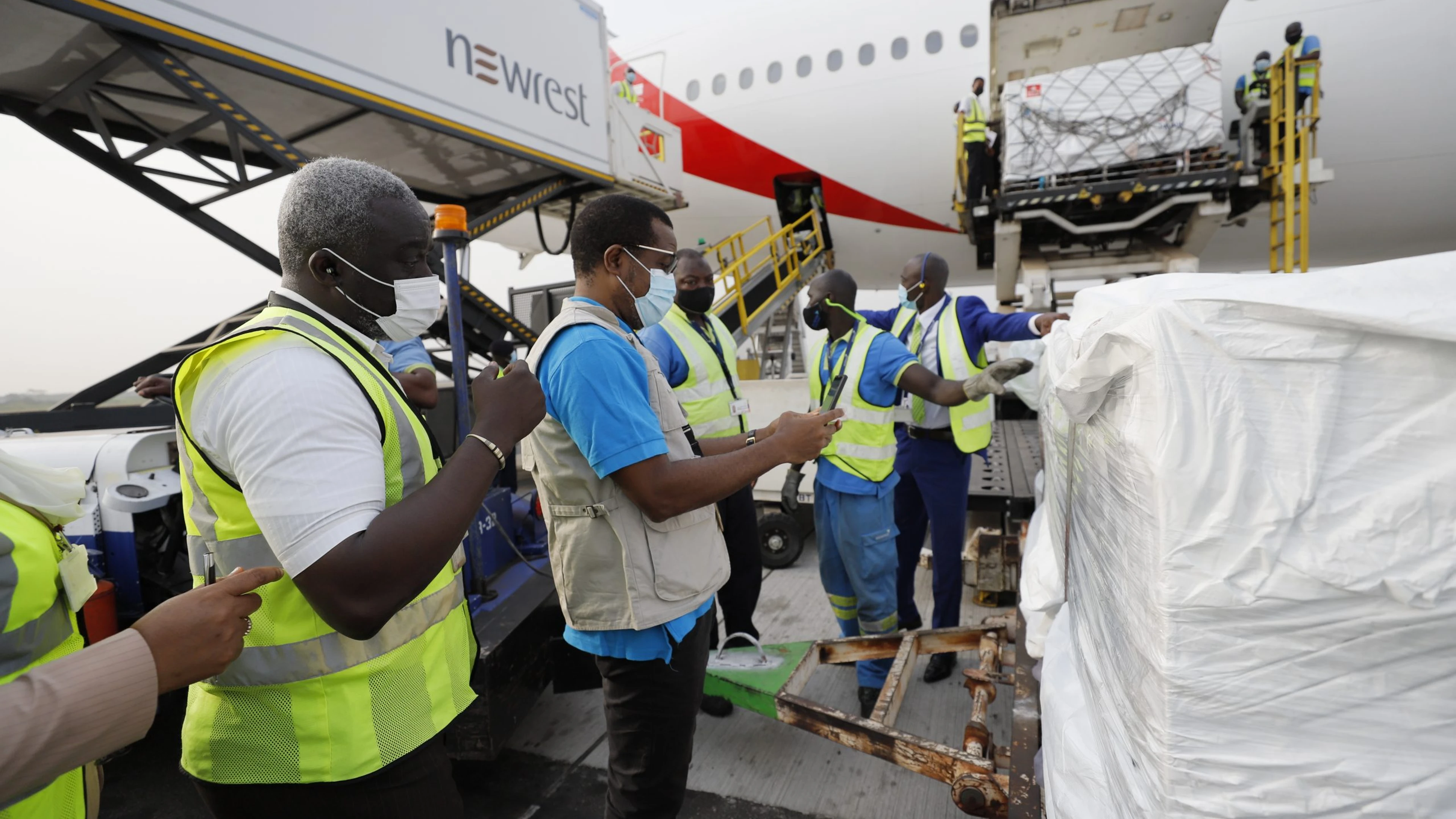
COVAX announces 600,000 doses of the AstraZeneca/Oxford vaccine licensed to Serum Institute of India have arrived in Accra, Ghana; further deliveries to Abidjan, Cote d'Ivoire are expected this week
Final first round of allocations for doses of AstraZeneca/Oxford and Pfizer-BioNTech vaccines, to the majority of countries and economies participating in the COVAX Facility, anticipated to be published in the coming days
Beginning of global rollout means that, as readiness criteria are met and doses produced, vaccines will be shipped to Facility participants on a rolling basis
GENEVA/NEW YORK/OSLO, 24 February 2021 — Today, Ghana became the first country outside India to receive COVID-19 vaccine doses shipped via the COVAX Facility. This is a historic step towards our goal to ensure equitable distribution of COVID-19 vaccines globally, in what will be the largest vaccine procurement and supply operation in history. The delivery is part of a first wave of arrivals that will continue in the coming days and weeks.
On 23 February, COVAX shipped 600,000 doses of the AstraZeneca/ Oxford vaccine, from the Serum Institute of India (SII) from Pune, India to Accra, Ghana, arriving on the morning of 24 February. The arrival in Accra is the first batch shipped and delivered in Africa by the COVAX Facility as part of an unprecedented effort to deliver at least 2 billion doses of COVID-19 vaccines by the end of 2021.
COVAX is co-led by Gavi, the Vaccine Alliance, the World Health Organization (WHO) and the Coalition for Epidemic Preparedness Innovations (CEPI), working in partnership with UNICEF as well as the World Bank, civil society organisations, manufacturers, and others.
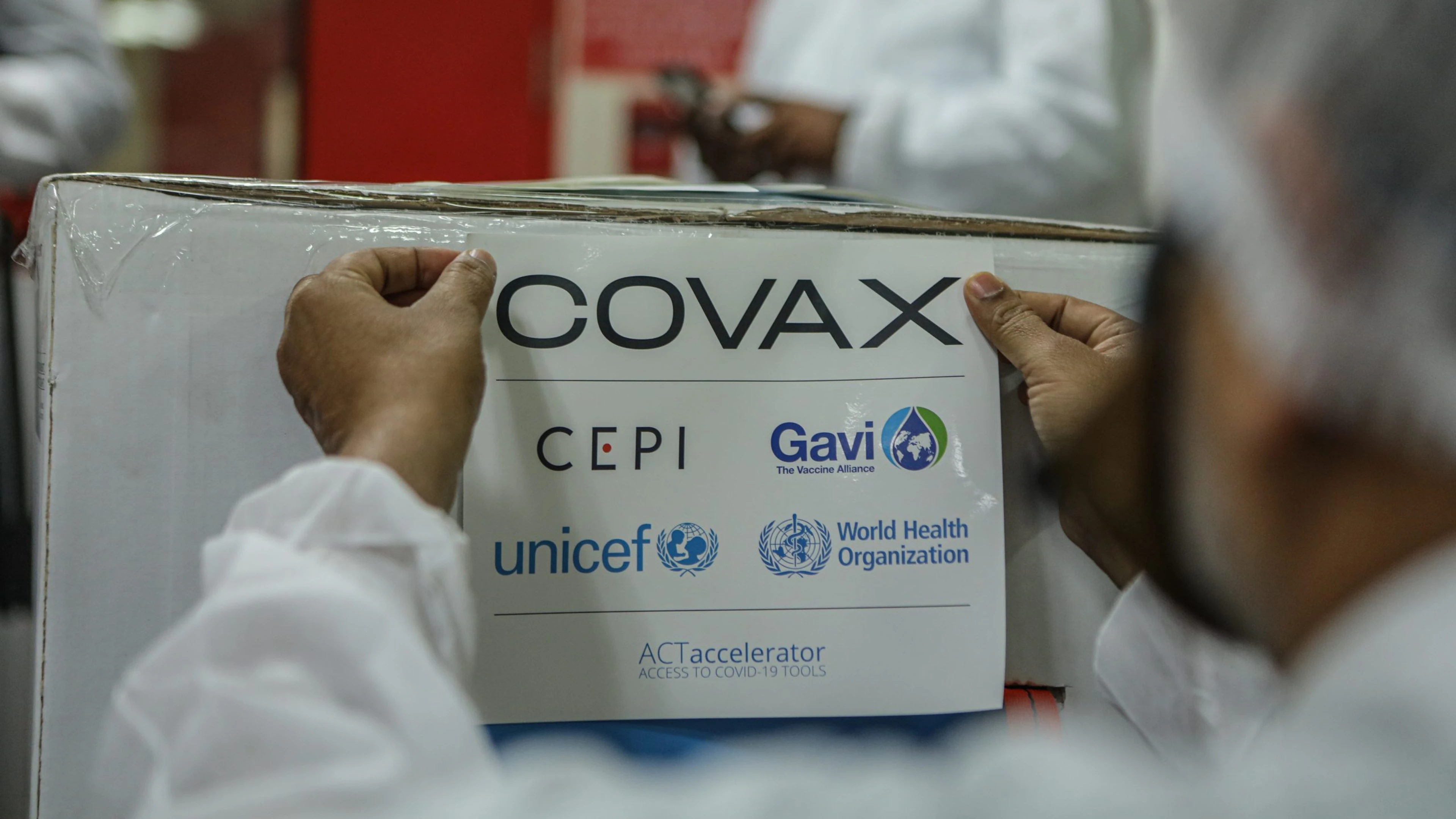
Credit: UNICEF/Krishnan
COVAX's mission is to help end the acute phase of the pandemic as quickly as possible by enabling global equitable access to COVID-19 vaccines. Today's delivery takes us another step closer to this goal and is something the whole world can be proud of.
Over the coming weeks, COVAX must deliver vaccines to all participating economies to ensure that those most at risk are protected, wherever they live. We need governments and businesses now to recommit their support for COVAX and help us defeat this virus as quickly as possible.
We will not end the pandemic anywhere unless we end it everywhere. Today is a major first step towards realizing our shared vision of vaccine equity, but it's just the beginning. We still have a lot of work to do with governments and manufacturers to ensure that vaccination of health workers and older people is underway in all countries within the first 100 days of this year.
This is a landmark moment in our efforts to get life-saving vaccine to the world. The fact that we now have multiple safe and effective vaccines against COVID-19 developed in record time is testament to the scientific community and industry rising to the challenge of this pandemic. With this shipment we also see the global community, through COVAX, responding to the challenge of delivering these vaccines to those who need them most.
Let us celebrate this as a moment of global solidarity in the struggle against the pandemic. But there is still much to do. With the increased spread of COVID-19 variants, we have entered a new and less predictable phase of the pandemic. It is crucial that the vaccines we have developed are shared globally, as a matter of the greatest urgency, to reduce the prevalence of disease, slow down viral mutation, and bring the pandemic to an end.
Today marks the historic moment for which we have been planning and working so hard. With the first shipment of doses, we can make good on the promise of the COVAX Facility to ensure people from less wealthy countries are not left behind in the race for life-saving vaccines.
In the days ahead, frontline workers will begin to receive vaccines, and the next phase in the fight against this disease can begin – the ramping up of the largest immunization campaign in history. Each step on this journey brings us further along the path to recovery for the billions of children and families affected around the world.
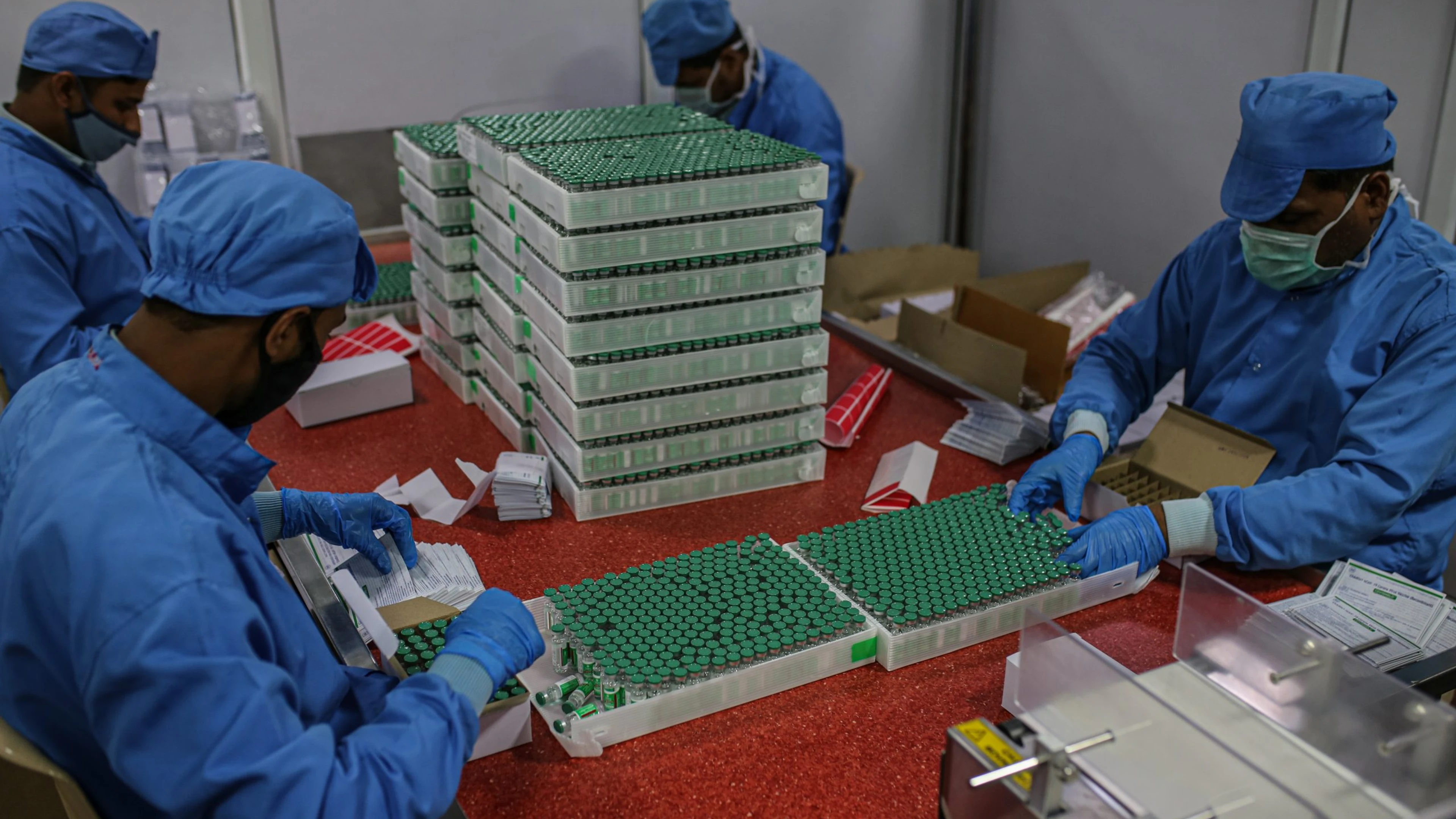
Credit: UNICEF/Krishnan
The vaccines arrived on a flight from Mumbai, via Dubai, where the flight also collected a shipment of syringes from a Gavi-funded stockpile at UNICEF's regional Supply Hub.
Over the past several months, COVAX partners have been supporting governments and partners, particularly for AMC-eligible participants, in readiness efforts, in preparation for this moment. This includes assisting with the development of national vaccination plans, support for cold chain infrastructure, as well as stockpiling of half a billion syringes and safety boxes for their disposal, masks, gloves and other equipment to ensure that there is enough equipment for health workers to start vaccinating priority groups as soon as possible.
In order for doses to be delivered to Facility participants via this first allocation round, several critical pieces must be in place, including confirmation of national regulatory authorisation criteria related to the vaccines delivered, indemnification agreements, national vaccination plans from AMC participants, as well as other logistical factors such as export and import licenses.
As participants fulfil the above criteria and finalise readiness preparations, COVAX will issue purchase orders to the manufacturer and ship and deliver doses via an iterative process. This means deliveries for this first round of allocation will take place on a rolling basis and in tranches.
Building on the interim distribution forecast published earlier this month, final information on the first round allocations, covering the majority of Facility participants, is expected to be communicated in the coming days.
COVAX has built a diverse portfolio of vaccines suitable for a range of settings and populations, and is on track to meet its goal of delivering at least 2 billion doses of vaccine to participating countries around the globe in 2021, including at least 1.3 billion donor-funded doses to the 92 lower-income Facility participants supported by the Gavi COVAX AMC.
Quotes from partners and donors
President Ursula von der Leyen, European Commission said: "I am delighted that today we have the first delivery of COVAX Vaccines in Accra, Ghana. This is the moment when the long days and nights of hard work finally show with tangible results on the ground. I want to pay tribute to the tireless efforts of our partners, Gavi, WHO and UNICEF. Team Europe will continue to stand by the people of Africa".
Prime Minister Jacinda Arden, New Zealand said: "Working towards broad global coverage of Covid-19 vaccines is both the right thing to do and the path to ending the pandemic. New Zealand acknowledges the remarkable work of GAVI, CEPI, the WHO and the COVAX Facility to get to this point".
President Pedro Sánchez, Spain said: ""Spain has been from the beginning at the core of the ACT Accelerator and other international initiatives to fight the virus, because only by stepping up can we be successful. No one will be safe until everyone is safe."
Senator the Hon Marise Payne, Minister for Foreign Affairs Minister for Women, Australia said: "In this pandemic we know no-one is safe until we all are, and to achieve that everyone must have access to safe and effective COVID 19 vaccines. With the first doses now distributed, Australia is proud to support the COVAX Advance Market Commitment as it delivers access to vaccines that will protect the world's most vulnerable."
Belgian Minister of Development Cooperation Meryame Kitir welcomes the delivery of the first vaccine doses with the Covax Facility in Africa: "This is great news. Belgium supports COVAX AMC because it will allow a number of countries to get access to COVID-19 vaccines. I hope this is the beginning of a fast roll-out to reach the goal of 2 billion doses delivered this year to the participating countries all over the world."
Karina Gould, Minister of International Development, Government of Canada and Gavi COVAX AMC co-chair said: "Canada has supported the COVAX Facility from the start. It will bring countries together, regardless of their income levels, to speed up the development, manufacture and distribution of COVID-19 vaccines. Today, we celebrate as COVAX kick starts its delivery of the first vaccines to Ghana. This brings us one step closer to achieving coverage for all high-risk populations, including health care workers, around the world. This is truly a milestone for us all."
French Minister for Europe and Foreign Affairs, Jean-Yves Le Drian said: "France welcomes the first deliveries of Covid-19 vaccine doses in Africa thanks to the COVAX facility, today in Ghana and on Friday in Cote d'Ivoire. This is a first concrete result that confirms the central importance of ACT-A, the key international platform for equitable and universal access to vaccines against Covid-19, which France helped launch together with the European Commission and WHO in spring 2020 in order to coordinate the global response to the pandemic. We must continue this effort of international solidarity by establishing, as proposed by the President of the Republic, dose sharing mechanisms that could speed up the distribution of vaccines in Africa."
Retno Marsudi, Minister of Foreign Affairs for Indonesia and Gavi COVAX AMC co-chair said: "I am encouraged by the significant progress made by the COVAX Facility for equitable access to vaccines. This first arrival of vaccines shows that global solidarity and multilateralism work and deliver results. As one of the co-chairs of the AMC Group, I welcome this milestone achievement. I urge all countries to ensure greater access and ascertain that no one is left behind."
Alessandro Rivera, Director General of the Treasury, Ministry of Economy and Finance, Italy said: "Italy is glad to see that COVAX will begin its vaccine rollout in AMC-eligible Countries in the coming days. This represents a landmark event, since we successfully allowed poorest Countries to get access to safe and effective vaccine within months from their approval in High Income Countries. Italy has supported the COVAX AMC since its inception in June 2020, and has pledged to date more than US$ 100 million. Our aim is to keep investing in multilateralism, international cooperation and solidarity, and as the current G20 Presidency we will ensure that these themes will remain at the heart of the global debate."
Keiichi ONO, Ambassador of Japan for Global Issues said: "We welcome the commencement of the delivery of vaccines through the COVAX Facility as an important first step. Since the launch of the COVAX Facility last June, Japan has been contributing to the designing of unprecedented mechanism and the funding to the AMC. Japan is committed to supporting to ensure equitable access to safe, effective and quality-assured vaccines."
Per Olsson Fridh, Swedish Minister for International Development Cooperation, Sweden said: "Today is a hopeful day in the fight against the devastating pandemic, and a hopeful day for multilateral collaboration. Sweden remains firmly committed to equitable global access to safe and effective vaccines."
Foreign Secretary Dominic Raab, United Kingdom said: "Today's rollout of vaccines to the world's most vulnerable countries is a huge step forward in ending this pandemic. As one of the biggest donors to COVAX the UK is ensuring that more than one billion vaccine doses will be sent to 92 countries so that no one is left behind in this global fight. We will only save lives and reduce the risk of future infections if we prevent the virus spreading in the world's developing countries."
Dr John Nkengasong, Director, Africa Centres for Disease Control and Prevention said: "These first deliveries of COVID-19 vaccines through COVAX are a critical moment in Africa's fight against the virus. Thanks to this global collaboration, additional members of key groups such as health workers and other vulnerable groups will have access to COVID-19 vaccines in the weeks to come. This is an important step towards our continental goal of immunising at least 60% of Africa's population with safe and efficacious vaccines against COVID-19, to ease the strain on our health systems and economies and continue our work towards our continental development agenda."
Thomas Cueni, Director General, International Federation of Pharmaceutical Manufacturers and Associations (IFPMA) said: "It is the first time in the history of pandemics that you will have vaccines rolled out in a coordinated manner to LMICs in less than three months of the very first Covid vaccine being granted the go ahead by the WHO. Just as the scaling up of the manufacturing from zero to millions in a matter of months is a historic achievement, the roll out to the last mile is an important milestone to mark. Manufacturers were among the founding partners of ACT-A and COVAX. We have fully played our role in not only scaling up manufacturing through an amazing number of collaborations but also in delivering on the shared goal of fair and equitable access to vaccines. But there are going to be challenges, whether in manufacturing or in delivery. We must work together to find solutions. This is how we have gotten so far in such a short time. Finger pointing and singling out manufacturers as not delivering will be counter productive."
Notes to Editors
List of donor pledges to the Gavi COVAX AMC is available here.
About COVAX
COVAX, the vaccines pillar of the Access to COVID-19 Tools (ACT) Accelerator, is co-led by the Coalition for Epidemic Preparedness Innovations (CEPI), Gavi, the Vaccine Alliance Gavi) and the World Health Organization (WHO) — working in partnership with developed and developing country vaccine manufacturers, UNICEF, the World Bank, and others. It is the only global initiative that is working with governments and manufacturers to ensure COVID-19 vaccines are available worldwide to both higher-income and lower-income countries.
CEPI is focused on the COVAX vaccine research and development portfolio: investing in R&D across a variety of promising candidates, with the goal to support development of three safe and effective vaccines which can be made available to countries participating in the COVAX Facility. As part of this work, CEPI has secured first right of refusal to potentially over one billion doses for the COVAX Facility to a number of candidates, and made strategic investments in vaccine manufacturing, which includes reserving capacity to manufacture doses of COVAX vaccines at a network of facilities, and securing glass vials to hold 2 billion doses of vaccine. CEPI is also investing in the ‘next generation' of vaccine candidates, which will give the world additional options to control COVID-19 in the future.
Gavi is focused on procurement and delivery for COVAX: coordinating the design, implementation and administration of the COVAX Facility and the Gavi COVAX AMC and working with its Alliance partners UNICEF and WHO, along with governments, on country readiness and delivery. The COVAX Facility is the global pooled procurement mechanism for COVID-19 vaccines through which COVAX will ensure fair and equitable access to vaccines for all 190 participating economies, using an allocation framework formulated by WHO. The COVAX Facility will do this by pooling buying power from participating economies and providing volume guarantees across a range of promising vaccine candidates. The Gavi COVAX AMC is the financing mechanism that will support the participation of 92 low- and middle-income countries in the Facility, enabling access to donor-funded doses of safe and effective vaccines. Gavi is fundraising for the COVAX AMC, and funding UNICEF procurement of vaccines as well as partners' and governments work on readiness and delivery, including support cold chain equipment, technical assistance, syringes, vehicles, and other aspects of the vastly complex logistical operation for delivery. UNICEF and the Pan-American Health Organisation (PAHO) will be acting as procurement coordinators for the COVAX Facility, helping deliver vaccines to COVAX AMC participants and others.
WHO has multiple roles within COVAX: It provides normative guidance on vaccine policy, regulation, safety, R&D, allocation, and country readiness and delivery. Its Strategic Advisory Group of Experts (SAGE) on Immunization develops evidence-based immunization policy recommendations. Its Emergency Use Listing (EUL)/prequalification programmes ensure harmonized review and authorization across member states. It provides global coordination and member state support on vaccine safety monitoring. It developed the target product profiles for COVID-19 vaccines and provides R&D technical coordination. WHO leads, along with UNICEF, the support to countries as they prepare to receive and administer vaccines. The Country Readiness and Delivery (CRD) workstream includes Gavi and numerous other partners working at the global, regional, and country-level to provide tools, guidance, monitoring, and on the ground technical assistance for the planning and roll-out of the vaccines. Along with COVAX partners, WHO is also developing a no-fault compensation scheme as part of the time-limited indemnification and liability commitments.
UNICEF is leveraging its experience as the largest single vaccine buyer in the world and working with manufacturers and partners on the procurement of COVID-19 vaccine doses, as well as freight, logistics and storage. UNICEF already procures more than 2 billion doses of vaccines annually for routine immunization and outbreak response on behalf of nearly 100 countries. In collaboration with the PAHO Revolving Fund, UNICEF is leading efforts to procure and supply doses of COVID-19 vaccines for COVAX. In addition, UNICEF, Gavi and WHO are working with governments around the clock to ensure that countries are ready to receive the vaccines, with appropriate cold chain equipment in place and health workers trained to dispense them. UNICEF is also playing a lead role in efforts to foster trust in vaccines, delivering vaccine confidence communications and tracking and addressing misinformation around the world.
About CEPI
CEPI is an innovative partnership between public, private, philanthropic, and civil organisations, launched at Davos in 2017, to develop vaccines to stop future epidemics. CEPI has moved with great urgency and in coordination with WHO in response to the emergence of COVID-19. CEPI has initiated ten partnerships to develop vaccines against the novel coronavirus. The programmes are leveraging rapid response platforms already supported by CEPI as well as new partnerships.
Before the emergence of COVID-19, CEPI's priority diseases included Ebola virus, Lassa virus, Middle East Respiratory Syndrome coronavirus, Nipah virus, Rift Valley Fever and Chikungunya virus. CEPI also invested in platform technologies that can be used for rapid vaccine and immunoprophylactic development against unknown pathogens (Disease X).
About Gavi
Gavi, the Vaccine Alliance is a public-private partnership that helps vaccinate half the world's children against some of the world's deadliest diseases. Since its inception in 2000, Gavi has helped to immunise a whole generation — over 822 million children — and prevented more than 14 million deaths, helping to halve child mortality in 73 developing countries. Gavi also plays a key role in improving global health security by supporting health systems as well as funding global stockpiles for Ebola, cholera, meningitis and yellow fever vaccines. After two decades of progress, Gavi is now focused on protecting the next generation and reaching the unvaccinated children still being left behind, employing innovative finance and the latest technology — from drones to biometrics — to save millions more lives, prevent outbreaks before they can spread and help countries on the road to self-sufficiency. Learn more at www.gavi.org and connect with us on Facebook and Twitter.
The Vaccine Alliance brings together developing country and donor governments, the World Health Organization, UNICEF, the World Bank, the vaccine industry, technical agencies, civil society, the Bill & Melinda Gates Foundation and other private sector partners. View the full list of donor governments and other leading organizations that fund Gavi's work here.
About WHO
The World Health Organization provides global leadership in public health within the United Nations system. Founded in 1948, WHO works with 194 Member States, across six regions and from more than 150 offices, to promote health, keep the world safe and serve the vulnerable. Our goal for 2019-2023 is to ensure that a billion more people have universal health coverage, to protect a billion more people from health emergencies, and provide a further billion people with better health and wellbeing.
For updates on COVID-19 and public health advice to protect yourself from coronavirus, visit www.who.int and follow WHO on Twitter, Facebook, Instagram, LinkedIn, TikTok, Pinterest, Snapchat, YouTube
About UNICEF
UNICEF works in some of the world's toughest places, to reach the world's most disadvantaged children. Across 190 countries and territories, we work for every child, everywhere, to build a better world for everyone. For more information about UNICEF and its work for children, visit www.unicef.org. For more information about COVID-19, visit www.unicef.org/coronavirus . Find out more about UNICEF's work on the COVID-19 vaccines here, or about UNICEF's work on immunization here.
Follow UNICEF on Twitter and Facebook.
About the ACT-Accelerator
The Access to COVID-19 Tools ACT-Accelerator, is a new, ground-breaking global collaboration to accelerate the development, production, and equitable access to COVID-19 tests, treatments, and vaccines. It was set up in response to a call from G20 leaders in March and launched by the WHO, European Commission, France and The Bill & Melinda Gates Foundation in April 2020.
The ACT-Accelerator is not a decision-making body or a new organisation, but works to speed up collaborative efforts among existing organisations to end the pandemic. It is a framework for collaboration that has been designed to bring key players around the table with the goal of ending the pandemic as quickly as possible through the accelerated development, equitable allocation, and scaled up delivery of tests, treatments and vaccines, thereby protecting health systems and restoring societies and economies in the near term. It draws on the experience of leading global health organisations which are tackling the world's toughest health challenges, and who, by working together, are able to unlock new and more ambitious results against COVID-19. Its members share a commitment to ensure all people have access to all the tools needed to defeat COVID-19 and to work with unprecedented levels of partnership to achieve it.
The ACT-Accelerator has four areas of work: diagnostics, therapeutics, vaccines and the health system connector. Cross-cutting all of these is the workstream on Access & Allocation.
For more information, please contact:
Iryna Mazur, Gavi
+41 79 429 3671
[email protected]
Evan O'Connell, Gavi
+33 6 17 57 21 26
[email protected]
Meg Sharafudeen, Gavi
[email protected]
CEPI Press Office
+44 7387 055214
[email protected]
WHO Press Office
[email protected]
Sabrina Sidhu, UNICEF New York,
+1 917 4761537
[email protected]
Anne Sophie Bonefeld, UNICEF Copenhagen
+4524694676
[email protected]
Eulette Ewart, UNICEF Ghana
+233-24-433-4996
[email protected]
Zafrin Chowdhury, UNICEF India
+919818106093
[email protected]
